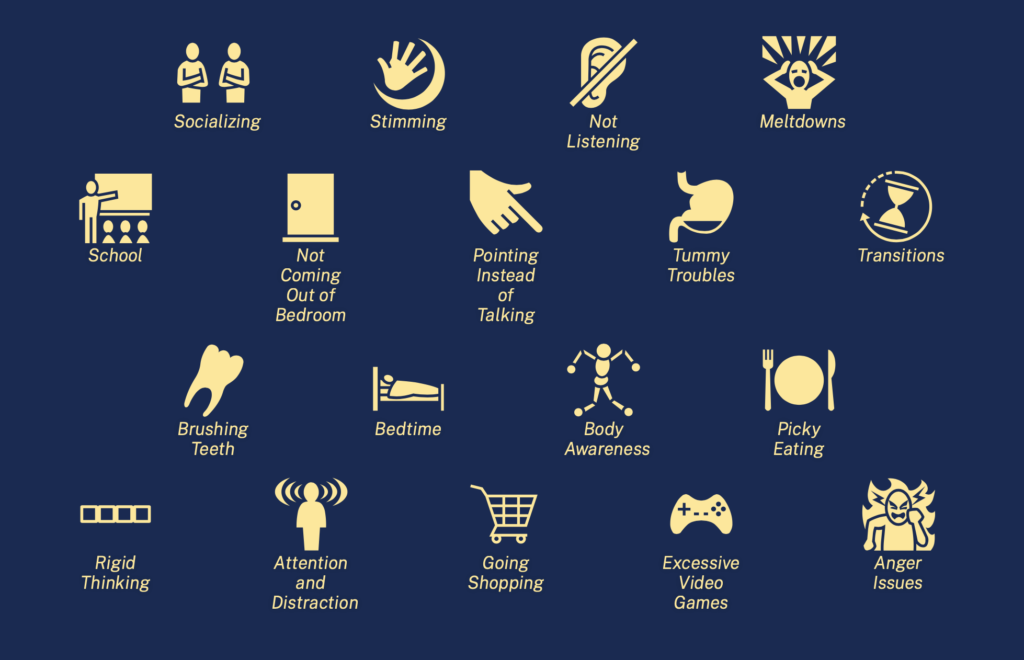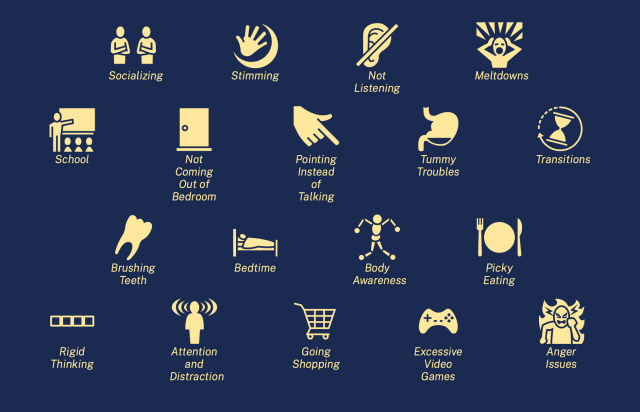Do you find any of these situations challenging?

- socializing
- stimming
- not listening
- meltdowns
- school
- not coming out of bedroom
- pointing instead of talking
- tummy troubles
- transitions
Want to know what’s really going on?
None of these things are the problem.
They’re symptoms of other problems.
And no, I can’t tell you right now what the problem is, exactly. Not without getting to know you and your kid better.
I have some ideas. I know what issues are common. But everyone is a little different.
(You’ve been to people before who claim they’ve got all the answers before even meeting you, right? Was that a good experience?)
Here’s the deal
No one wakes up in the morning thinking, “I’d really like to be miserable today. What can I do to make my life as difficult as possible and hurt the people around me?”
No one does that. Seriously.
Your kid isn’t having meltdowns because he enjoys them.
She’s not arguing with you because it feels good.
He’s not avoiding homework because he wants another lecture on the importance of education.
She’s not stimming again because she likes getting disapproving looks.
No one wakes up in the morning thinking, “I’d really like to be miserable today.”
So what is going on?
I’ll let you in on a little secret…
Those “problems” above are really coping strategies.
They’re your kid’s best, albeit inadequate, attempts to deal with situations that hurt, that are stressful, that provoke anxiety, or other bad feelings.
And no, that doesn’t mean you’re a bad parent. In fact, I’m quite positive you’re doing your absolute best. Honestly.
And there are things going on in your kid’s body and brain that influence how he perceives the world. In sometimes unexpected ways. That’s not news to you. You know this. You just don’t know how to figure out how he perceives the world or what to do to make it better.
That’s where I come in. I can help you make sense of what’s going on inside your kid, so that you can finally make it better.
How are meltdowns a coping strategy?
Think about it like this. When you have something coming up that you’re really not looking forward to — I mean, something that really kicks you in the head every time. Maybe it’s a person who pushes all your buttons, or an event that gets under your skin, or a task that makes you feel awful every time.
It’s hard to be your best self when you’ve got more to deal with than you can handle.
How do you deal with it? Do you grin and bear it? Face it head on? Just push through? Probably. For a while. But what if it’s every day? Or you just went through something big that drained all your energy. Or you’re stressed by a million other things going on? And you haven’t gotten enough sleep?
Maybe now your patience is wearing thin. You’re a bit irritable. Quicker to snap. Maybe you feel bad about that afterward, but in that moment? Yeah, things aren’t so peachy.
It’s hard to be your best self when you’ve got more to deal with than you can handle.
Autistic kids (and adults) are no different in that way.
The things that stress us out are sometimes different. We often react more strongly, and faster, to things that don’t bother other people. But the basic situation is the same.
How big is your bucket?
Here’s another way to look at it.
Everyone has a bucket for how much stimulation they can take before overflowing, and everyone’s bucket is a different size. Your kid’s bucket is a bottle cap.
Mine was, too, for most of my life.
As a kid, when my bottle cap was nearly empty and I was feeling good and had energy, I could be pleasant to be around, and want to go out, and try different things, and sensory issues and transitions and all that other stuff didn’t bother me quite as quickly. But it didn’t take much for something to fill up my bottle cap, and that’s when I got, well, let’s call it “unpleasant to be around.”
How big is your bucket?
Mine’s grown a lot bigger in the past several years, as I’ve done a lot of work to take out the sticks and rocks that were filling it up and making it overflow. I still can’t handle as much stimulation as most people; I probably never will. But I can deal with a lot more than ever before, and it’s opened my world to whole new possibilities.
It started with reframing my “issues” as symptoms, so that I could stop wasting my time on surface strategies and go looking for the real things that were pushing me beyond my ability to cope.
How else do autistics cope?
We (autistics) do pretty much the same things you do.
We avoid situations that hurt us:
We withdraw to our rooms, play alone, cancel social plans at the last minute, or get sick when it will throw off plans.
These aren’t usually conscious behaviors, they’re just bigger versions of the same avoidance strategies you use to get out of things you don’t want to do. Have you ever gotten sick at exactly the wrong (or the right) time?
What else?
We try to calm ourselves down:
You’ve probably figured out ways to get through those awful situations you don’t want to do, but have to. You don’t just push through it. You take a few deep breaths. Or promise yourself that you can have an ice cream afterwards. Or you try to find a silver lining. Maybe you take a walk. These are all strategies that you use.
Your kid needs to find strategies that work for him to get through tough situations.
Right now, his lack of effective strategies means he’s muddling through it, and it’s not really working. He’s being pushed beyond his limits too often, and that’s leading to meltdowns. Withdrawal. Rigid behaviors. Tummy issues. Headaches. Picky eating. Sleep disturbances. These are all symptoms of stress.
So is stimming (sort of).
What’s that about stimming?
Stimming is a bit different because it’s both a result of stress, and a strategy to calm down. It is one of the effective strategies we develop naturally.
The hand flapping, jumping, rocking, spinning, hitting ourselves, or whatever, provides pressure or motion (proprioceptive and vestibular input, if you want to get technical) on our nervous system, and calms us down.
So trying to repress our stimms is a double whammy.
You might fidget when you’re nervous, or wring your hands, or tap your foot, or tap a pen, or chew the end of it. These are all stimms, they’re just so common that they’re socially acceptable. Our stimms tend to be bigger, but they’re accomplishing essentially the same function. They help us calm down.
So trying to repress our stimms is a double whammy. It both doesn’t let us get the calming affect, and it takes a lot of energy to try to repress the impulse, which further the ramps up our stress.
Let’s get back to those challenges
I started out by saying that those weren’t the problems themselves. When you’re arguing about bedtime, it’s not about bedtime.
Picky eating isn’t about the food, and it’s not about controlling or manipulation, either.
Anger issues aren’t coming out of nowhere.
A lack of motivation isn’t a failure to understand the benefits of a good education, or the consequences of bad grades.
Because the problem isn’t a lack of effort. Or will. Or motivation. There’s something getting in the way.
Meltdowns are not tantrums. They are not a choice. They are not manipulative. They are an extreme stress reaction.
And attention problems aren’t due to a lack of effort. I guarantee you, she’s making a tremendous effort, and it’s still not working.
Because the problem isn’t a lack of effort. Or will. Or motivation.
There’s something getting in the way.
Bringing it home…
Say your kid has difficulty with transitions. So you go online, or talk to your experts, and get some strategies to deal with transitions. Maybe you implement a visual schedule, or use a visual timer, or remind him when it’s almost time to do something else.
Do those things help? Probably a little. But he still has difficulty with transitions. Especially when other things are already stressing him out.
Because challenges with transitions are a symptom of an underlying issue. So just working on transitions is like putting a bandaid on a gaping wound. It helps a bit. But it doesn’t address the real issue.
So what IS the real issue?
So the goal becomes, to figure out what is stressing your kid out (for a start). Without knowing you personally, I’d humbly suggest… Sensory issues are a really good place to start.
For example:
- fluorescent lights, LED lights, anything that’s too bright
- certain sounds, loud noises, sudden noises, such as flushing toilets, silverware on dishes, sound effects coming from the TV, the microwave beep
- the smell of certain foods, bathrooms, musty rooms, cleaning products
- clothing textures
- tags in clothing
- the high contrast of black writing on white paper (this website’s not white for a good reason)
- glossy textbooks and magazines
- needing movement to think but being told to sit still
- fast moving objects (nothing on this website moves unless you click it, that’s intentional)
- neon colors, or anything too bright
- multiple people talking at once, such as in a restaurant, classroom, store, or public place
- the feel of water on hands or skin
- the sound of traffic driving by outside
- the feel of the toothbrush in the mouth
- and much, much more…
Any or all of these are capable of overloading our ability to cope. For us, the sound of a car driving by outside can be as intense as the sound of nails on a chalkboard for you.
It’s not a matter of willpower or self-control, and learning to tolerate it is counterproductive (ask me why later).
And this is just the sensory stuff. There are potentially other things getting in the way, leading to attention problems, meltdowns, etc.
Other common issues include (may or may not apply to your kid):
- attention issues often signal an incomplete integration in the auditory and visual nerves—which may be improved
- poor emotional regulation can be a symptom of poor body awareness (interoceptive sense)—which can be improved
- so can toiliting issues, clumsiness, gross motor control—again, these can be improved
- reading difficulties and walking into furniture may be related—and can be improved
- sensory issues signal poor nervous system integration—and improving integration is possible at any age
- anger outbursts may be related to poor motor control, or pattern recognition challenges, or the normal frustration of getting help that doesn’t help the areas that need help—all of which can be improved
- rigid behaviors and thinking is usually an attempt to control unpredictable situations—and visual schedules may, for some, actually be a source of more stress
- stimming is, interestingly, both a result of stress and a strategy to calm down—with stress lowered, these naturally fade
These are meant only as suggestions of what might be happening, of what things are common. It is not intended as medical advice—or advice of any kind, really.
Now, how do we fix this stuff?
First things first.
You can’t learn and grow and thrive when you’re struggling to just get through each day, and your kid is the same.
So we’ll first find and reduce his hidden stressors, so that other improvements become possible.
With his stress load lower, we’ll start looking for other things. And most of the time, he’ll be feeling so much better that he will get on board with helping.
And the more things that we can find to help, the easier it will be to find other barriers, because they won’t be as masked. Then we can find things that help those issues. And your whole family will feel better, which will give you the energy and excitement to find other things…and it will be a nicely upward spiraling circle of progress.
So we’ll first find and reduce his hidden stressors, so that other improvements become possible.
That’s not to say there won’t be obstacles and difficulties, but the general tenancy will be positive and hopeful.
Bottom line…
As part of your kid’s team…
- We find hidden stressors that are pushing your kid into overwhelm.
- With stress lower, we find other barriers that are getting in the way of your kid’s success.
- Explore strategies to strengthen areas of challenge and build resilience to try again.
- Reinforce your kid’s existing positive skills and attributes.
- Repeat all of the above as needed.
- Watch your butterfly gradually emerge and explore a new world.
What’s that about positive skills and attributes?
We’ve talked a lot about the challenges of autism. And I know, it’s super easy to focus on those. I get that. I really do.
And it’s not all difficult. There are also wonderful things about an autistic mind.
Maybe your kid has a great sense of humor, or his love of order keeps his room tidy. Maybe his special interest makes it easy to shop for presents, or he has a good memory, or he can entertain himself for hours. Or she doesn’t bother hiding her crushes from you, so you always know what’s going on. Maybe she’s good with younger kids, or he can communicate well with adults. He always orders the same thing at restaurants you frequent, so there’s no agonizing over the menu. Maybe she’s great at figuring out how things work, is an expert packer, or can organize better than anyone. When you’ve missed a line of dialogue on TV, he can repeat it for you verbatim.
These are just a few examples from people I know. What’s something wonderful about your autistic kid?
We want to highlight and reinforce these positive traits while we work on the challenges. It’s vital that your kid builds a positive self image as a worthwhile person, with worthwhile skills, and hope for the future.
Because a positive future is where we’re aiming.
How much progress can we expect?
What a child is capable of when he’s stressed out and anxious is so vastly different from what that same child is capable of when he’s feeling good, that there is no way to tell where this might lead.
I can’t promise any specific gains. And I’m not offering a cure for autism. All I can promise is that I will give you my best, and that if you’re committed to this process, we can work together to find what works for your child and your family.
That can change your child’s entire trajectory.





One Response
Feeling good is the best ^.^ And I do feel good most of the time, because I am fed and have slept well, or I am doing something that makes me feel comfortable. But sometimes (like right now) when I am left alone, away from all the stress and things that go on, I start to miss people.
Also, not being able to talk and just generally closing up around people for around a week is just not fun.
I’m about to finish school for good, and everyone around me is stressing. I haven’t started an assessment that’s due this week. It’s all being rushed out. But…. having a good and laid back attitude is really helping at the moment, and being completely okay with the fact that people are often busy. <:)